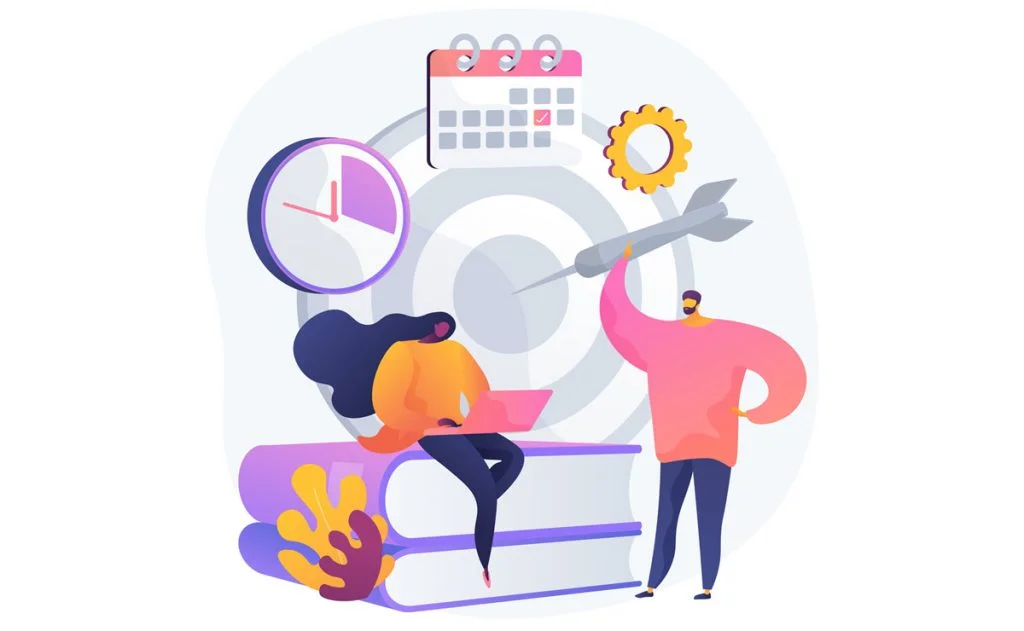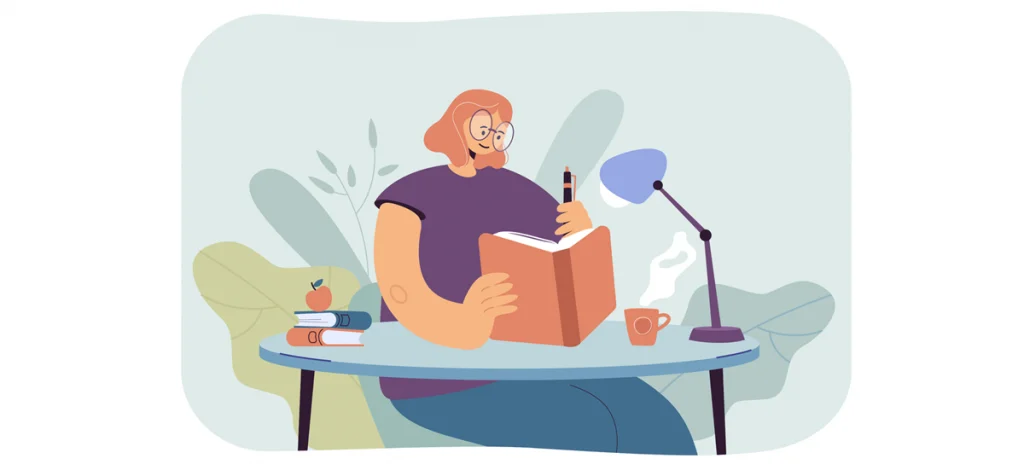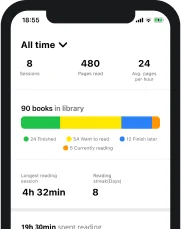If you’re anything like us here at Basmo, reading is your go-to activity whenever you feel the need for some quality entertainment. You read whenever you get a chance to pick up a book, you do it on your commute to and from work, before going to bed and on every single occasion you find.
Perhaps at one point you even wondered whether you are maybe reading too much. We did too, several times. And since we know that this is a question that many of our users have tried to find an answer to, we got to work and tried to figure out exactly how much reading is too much and what associated risks come from overdoing things in your favorite hobby.
Can you read too much?
Even though reading has tons of benefits for you, including mental and physical health benefits, general knowledge improvement, and enhanced levels of empathy, there is always a chance to get too much of a good thing. Sadly, there is such a thing as too much reading and the best way to make sure you don’t go over the threshold where you start getting exposed to various risks associated with unhealthy reading habits is to stay informed.
Learn to recognize the effects of too much reading, be mindful of your reading habits and stay prepared to change them whenever you feel things are no longer working for you as planned. One thing I would like to disclaim right off the bat is that the odds of you doing so much reading to start getting seriously affected by it are quite low. Let’s put it this way: drinking water is not only healthy, but it is actually essential. However, drinking too much water will affect you in certain ways, nothing too serious, but enough to create a certain level of discomfort.
That is the best way you can understand the concept of “reading too much”. You can read too much like you can drink too much water, but the chances of actually getting to that level and feeling some serious consequences are quite low.
Give Your Reading Experience
An Extra Boost With Basmo
Track the books you read, monitor the time you spend reading and keep notes on your reading habits and how it makes you feel. You can set yourself targets for the time you spend reading and you can get notified whenever you’re behind on your reading time.
How much reading is too much?
Even though we are all different, the official recommendation for the average person is to not read more than one hour in one sitting or four hours overall in a single day. That is simply because reading is an intense mental process and your brain and your eyes need time to rest in order to continue being productive and avoiding problems like eye strain or mental exhaustion.
The rule of thumb when it comes to determining how much reading is too much is to figure out when your hobby starts taking over other important aspects of your life. Each of us is different and we live very different lives, so what seems like too much for you might be just the warm-up for another reader. But what’s important to remember is to always be mindful of your reading habits and to pay attention to how they impact your life.
For example, if your nightly reading sessions start running for too long, you will certainly start feeling tired and less productive at your job. That means that reading is starting to affect your work life, and that is a sign of a possible reading problem starting to brew.
If you start feeling like you are too disconnected from reality and you keep burying your mind in different stories and avoiding facing your real problems in real life, that can also be a warning sign that you are doing too much reading.
Spending all your free time reading instead of making time for your family and loved ones can also become problematic. Even though reading is usually an enlightening and introspective activity that has countless benefits, it cannot replace our need for human interaction. If it starts feeling like you’d rather stay home alone and read a book instead of going to a family dinner, perhaps it’s time to reanalyze your life and reading habits and make some adjustments.
Is reading too much bad for you?
Even though the Basmo team generally recommends doing as much reading as possible, there are certain risks associated with reading too much that you should be aware of. Reading too much can be bad for you and it can have a negative impact on you as a human being and on your day-to-day life. As I said before, these risks are not too serious, and reading habits are usually pretty easy to change in order to make the right adjustments to avoid the risks.
Can too much reading affect the brain?
Reading is not a dangerous habit, it is actually one of the most beneficial activities for your brain’s well-being. But too much reading can start being counterproductive after a certain threshold.
Your brain works by constantly creating neuronal connections and storing information, but its capacity has its limits. If you read too much, you can reach a point of information overload where your brain starts working below its normal capacity simply because there is too much data for it to process at once.
The next logical thing to worry about when it comes to the side effects of reading too much is obviously fatigue. We all know how we feel after a long reading session: tired, light-headed, and somewhat overwhelmed. There’s a reasonable explanation for that: our brain requires resources, glucose to be more precise. And if we are involved in a mental process that is intense enough to burn these resources quicker than the body can replace them, our brain will run into a deficit. That is when we start feeling tired and less productive.
Is reading too much bad for your eyes?
Generally, reading is a beneficial activity all around. But overdoing it might cause some issues to the parts of your body involved in the process. So, naturally, we had to take a look at how reading too much can impact our eyes.
Well, the first thing to note is that there are a lot of myths regarding our eyesight. One of those, luckily, is that reading too much will have a serious impact on our eyesight or the health of our eyes. The truth is that there is absolutely no evidence of any long-lasting negative effects of reading on our eyes.
That being said, there are some things we need to take into consideration though. Even though you will not lose your eyesight or damage it in any way through doing too much reading, you can cause some eye strain if your reading sessions run for too long. The symptoms are quite easy to identify: your eyes may be itchy, watering, or you might even get blurry vision. Luckily, these symptoms go away quite easily and quickly. Take a break from reading, get some sleep, and you will wake up without any eye problems.
Another important aspect regarding the way reading impacts our eyes is the position we do our reading in. If we read and force our eyes to focus at a slightly awkward angle, chances are we’ll feel that eye strain a lot quicker.
Can you get a headache from reading too much?
Yes, reading too much can cause us to experience some pretty nasty headaches. While some might think it has more to do with the way our brain burns through those glucose reserves, the truth is that our eyes are actually the ones responsible for any reading-related headaches.
There are certain ways in which our eyes can cause us headaches while reading.
- If we read at a close range, our eyes might feel a strain that results in a nasty headache
- If we read for too long, our eyes can become dry. That’s because reading sometimes alters our blinking patterns, forcing our eyes to stay open for longer than normal. If we recognize the signs early on and take a break, the only symptoms of dry eyes will be some itching and discomfort. If we ignore the signs, we might end up with a headache
- If we have an untreated eye problem (for example if we need glasses but we don’t wear them), long reading sessions may result in pretty nasty headaches.
Is reading too much a sign of depression?
Well, this is a quite delicate question. Reading and depression do have a connection at a certain level, and yes, reading can be a sign of depression. But the reality is that depression is a much too complex condition to be identified just through a person’s reading habits.
Some people with depression do use reading as an escape or even as a healing activity. They use reading to allow themselves to emerge in alternative universes and tend to forget for a while about the rough reality of their own lives. Reading long hours, isolating themselves from other people, and choosing to read alone instead of doing pretty much anything else can be signs of depression, but there are a lot more things to factor in before deciding whether the long reading sessions are an actual indicator of depression.
Reading for too long alone cannot be considered a sign of depression unless it is accompanied by other warning signs.
How to make sure you don’t read too much?
If you are worried about the disadvantages of reading too much and you want to make sure you don’t move past the threshold where reading can become problematic for you physically or simply for the quality of your life or your general well-being, you’ll be thrilled to find out that there are solutions. One of them comes right from us as an amazing reading tracking app designed to help you overcome any difficulties reading may cause you.
One of the things we take special pride in is how the Basmo app comes packed to the brim with features engineered to help you become a better, more efficient reader. Some of these can be exceptionally useful if you want to make sure you read just enough, without overdoing it.
Create a clear reading schedule
Keeping your reading habits under control starts with creating a clear schedule for your reading sessions. That will help you make sure you limit yourself to just enough reading every day, without exaggerating or risking experiencing any of the downsides of reading too much.
Basmo’s scheduling feature is very easy to use and versatile. It encourages you to select the exact days of the week when you want your reading sessions to take place and even different times for each day so you can easily adjust your schedule according to your daily routine. The app will also remind you of the upcoming reading sessions that you have scheduled so you never risk straying off from the schedule.
Track your reading metrics
Basmo is actually a reading tracking app. As the name suggests, it should be mainly used to track different important metrics of your reading sessions.
The app records each session and keeps track of your reading speed, the time you spend reading every day, and the number of pages you read.
That way, you can always stay on top of things and keep an eye on how much you read, and how long you spend reading every day, and as soon as you see a problem starting to brew, you can simply adjust your habits accordingly.
Reading goals
Basmo also encourages you to set reading goals. These can work both ways. You can either set your goals to make sure you read enough, or you can choose to set them in order to make sure you don’t read too much.
Even though the app also offers the possibility of setting a yearly goal for the number of books you read throughout a year, the daily goal functionality is much more relevant in our case. For example, if you want to make sure that you don’t read too much in a day, you can set a goal for the number of minutes you want to spend reading every day. When that goal is reached, the app is going to notify you and you will then know that it’s time to stop.
Final thoughts on reading too much
Frankly, reading too much is quite unlikely to ever become an issue for any of us considering how little free time we have. In case it does become an issue, you now have all the information necessary in order to easily overcome it. Using Basmo can work wonders for your reading habits.







